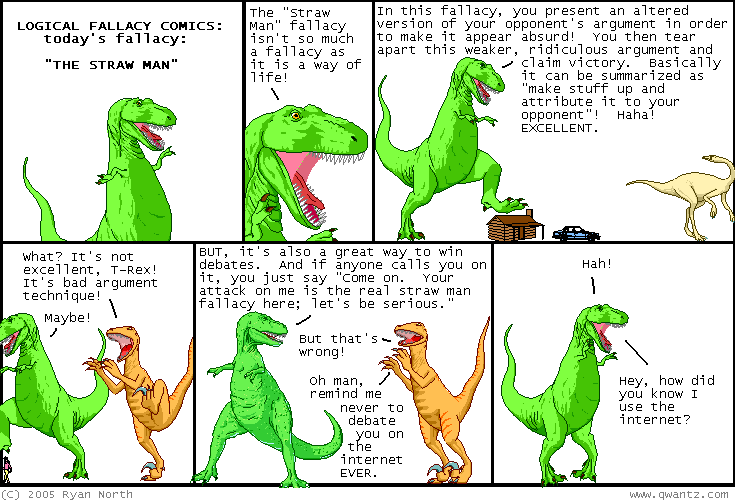January 21—23Wednesday: Introduction to class (no reading)
Friday: Logic Intro (no reading)
January 26—30 Monday: Understanding Arguments (1.1-1.6) (group work)
Wednesday: Evaluating Arguments (2.1-2.2)
Friday: Arguments: Deductive (2.3) (group work)
February 2—6Monday: Evaluating Deductive Args (no reading)
Wednesday: Fancier Args & Statements (2.4.-2.5)
Friday: Arguments: Inductive (2.6-2.8);
Homework #1 due February 9—13Monday: Arguments: Abductive (no reading) (group work)
Wednesday: Fallacies (3.1-3.2)
Friday: Fallacies (3.3);
Quiz #1 (and group work)
February 16—20Monday: Fallacies (3.4-3.6)
Wednesday: Fallacies (finish chapter 3);
Group Project #1 (in class)
Friday: Fallacies (4.1-4.3)
February 23—27Monday: Fallacies (4.4; 4.6)
Wednesday: Fallacies (4.7) (group work)
Friday: Fallacies (finish chapter 4)
March 2—6Monday: Fallacies (5.1-5.3);
Homework #2 dueWednesday: Fallacies (5.4-5.7)
Friday: Fallacies (5.7-5.9) (group work)
March 9—13Monday: Fallacies (finish chapter 5);
Group Project #2 (in class)
Wednesday: Review for Midterm (no reading);
Paper #1 dueFriday:
MIDTERMMarch 16—20SPRING BREAK! (no class) (woo?)  March 23—27
March 23—27Monday: Psychological Impediments (6.1-6.3)
Wednesday: Psychological Impediments (6.4-6.6)
Friday: Psychological Impediments (6.6-6.9)
March 30—April 3 Monday: Psychological Impediments (group work)
Wednesday: Cognitive Biases (handout)
Friday: Cognitive Biases (handout);
Group Project #3 (in class)April 6—10Monday: Intellectual Honesty (3.3, 3.7, 4.5)
Wednesday: Intellectual Honesty: Charity (handout)
Friday: Intellectual Honesty: Ignorance (group work)
April 13—17Monday: Intro to Writing Essays (9.1-9.2);
Quiz #2Wednesday: Writing Essays (9.3-9.4)
Friday: Writing Essays (finish chapter 9);
Homework #3 due April 20—24Monday: Evaluating the Source: Ads (10.1-10.3)
Wednesday: Ads (10.4-10.5)
Friday: Evaluating the Source: News (11.1-11.4)
April 27—May 1Monday: News (11.5-11.8)
Wednesday: Reliability of Experts (handout)
Friday: Prepare for group presentations (no reading) (group work)
May 4—8Monday:
group presentations (no reading)
Wednesday:
group presentations (no reading)
Friday:
group presentations (no reading)
May 11—13Monday: review for Final Exam (no reading)
Wednesday:
FINAL EXAM (12:00--12:50)
 1. Tool: Here's one Urban Dictionary definition of "tool," the one I had in mind when referring to Dane Cook:
1. Tool: Here's one Urban Dictionary definition of "tool," the one I had in mind when referring to Dane Cook:  Did I forget any terms? Let me know!
Did I forget any terms? Let me know!







